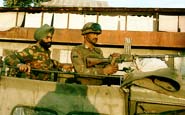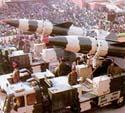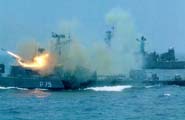The Rediff Special
'Tanks, planes and even nuclear weapons do not
provide a group of nations with true security'
US Ambassador to Pakistan Thomas W Simons, Jr discussed regional stability in South Asia
at the prestigious United Service Institution, New Delhi, last week. This is what he had to say:
 General Nambiar, members of the United Service Institution, I
am honoured by this opportunity to address you and your assembled
guests. I am aware of some of the speakers who have preceded me
to this podium and hope that I will serve as well as they did
to entertain your imaginations and stimulate your thoughts on
the subject at hand.
General Nambiar, members of the United Service Institution, I
am honoured by this opportunity to address you and your assembled
guests. I am aware of some of the speakers who have preceded me
to this podium and hope that I will serve as well as they did
to entertain your imaginations and stimulate your thoughts on
the subject at hand.
I would like to take a few minutes to share two propositions with
you. I believe that they are interrelated and that they have important
implications for India and for the whole South Asia region.
1. The end of the Cold War is changing the ways in which the US
and many other of India's partners in world affairs define national
security needs.
2. It can often be productive to negotiate with rivals, and it
is possible to do so without sacrificing either underlying principles
or major national security goals.
In the process, I hope to convince you that a confident and stable
Pakistan is good for India, just as I hope to convince you that
a strong US relationship with Pakistan is good for India.
In making these assertions I draw upon my now-distant memories
of living as a child on the subcontinent in areas that became
both India and Pakistan, just before and just after Partition,
and again during the summer of 1959, which I spent as a college
student visiting with my parents in Madras and travelling around
South India. My mother, at 85, is in the audience, and we have
just returned from a brief but glorious return to Madras, hospitable
as ever.
Ambassador Wisner is and will remain your authoritative interpreter
of US policy views; with 35 years of service, he is my career
senior by two years. But at least my South Asia experience antedates
his: My family landed in Calcutta in December 1945, after a six-week
steamer journey. Shortly thereafter I was sent off to school in
Mussoorie, partly because my parents could sense the rising communal
tensions which led in August 1946 to the Direct Action.
Since I am still new to the Subcontinent professionally, however,
for these remarks I draw mainly upon more than three decades of
diplomatic experience largely involved with the US- Soviet Cold
War, which dominated the world of those decades and which has
now ended. Of course, not everything I witnessed then applies
here, but my observation and my assertions, which I offer for
discussion, is that some things do.
An Evolving Definition of Security
 During the Cold War the main features of the American approach
to world affairs were remarkably consistent and even predictable.
Granted, they evolved over time in important ways and had many
complex facets. But the essentials were plain, straightforward,
and widely accepted by the American people, and they were familiar
to the rest of the world which, for good or ill, had to deal with
the Americans.
During the Cold War the main features of the American approach
to world affairs were remarkably consistent and even predictable.
Granted, they evolved over time in important ways and had many
complex facets. But the essentials were plain, straightforward,
and widely accepted by the American people, and they were familiar
to the rest of the world which, for good or ill, had to deal with
the Americans.
Let me recall them for you briefly:
First, without ties of blood or ancient tradition to bind it together,
the United States is, of necessity, a nation based on shared values.
Two beliefs - in democracy and in the market - have been distilled
from our history as the core public values which largely define
what the country is for us. We believe, moreover, that these values
are interrelated: democracy requires the marketplace, and a free
market functions best with democratic politics.
Second, in our dealings with other nations we have been guided
in this century by the perception that however large and resource-rich,
however well-protected by oceans and peaceful land borders, we
cannot sustain our independence and cannot preserve our values
entirely on our own. We need allies and international partners,
and we tend to seek them among nations which share elements of
our own core values.
Third, very soon after World War II we came to see ourselves in
a state of fundamental competition with the Soviet Union. It was
also a large, resource-rich, and ideological state, bound together
by values, but values which were very different from ours: democracy
and the market as Americans understood them were seen instead
by the Soviets as great evils for mankind. So we rather quickly
came to identify each other as adversaries, each representing
a severe threat to the other's core values and, potentially, to
the other's existence.
This competition between two great ideological, continental powers
permeated most aspects of international relations and divided
the world into two opposing camps.
All this is familiar to you, of course. I would draw your attention,
however, to one feature of the Cold War landscape which is less
familiar, but which I feel is nonetheless crucial.
In the second decade of the Cold War -- about the time Ambassador
Wisner and I entered our Service - the United States began to
run up against the problem of how actually to accomplish anything
in world affairs beyond mutual stalemate. Clearly, something new
was necessary, a new way of engaging the Soviets, if nuclear war
was to be avoided.
 Negotiation was a strong candidate for this new approach to world
affairs, despite equally strong drawbacks. Successful negotiation,
you see, requires concessions of substance, and yet in value-based
countries every concession can be attacked politically as betrayal
of those values - the first step on the slippery slope to surrender,
as it used to be described.
Negotiation was a strong candidate for this new approach to world
affairs, despite equally strong drawbacks. Successful negotiation,
you see, requires concessions of substance, and yet in value-based
countries every concession can be attacked politically as betrayal
of those values - the first step on the slippery slope to surrender,
as it used to be described.
The question was: 'When you are locked in ideological combat with
a mortal enemy, under what circumstances is it morally permissible
on the one hand, and politically feasible on the other, to seek
any agreement, no matter how minor or mutually advantageous, with
that enemy?'
That both sides succeeded in finding ways to negotiate for limited
ends without sacrificing their core values is perhaps the major
accomplishment of the second half of the Cold War.
The accomplishment arose from the recognition in the government
elites of both countries that nuclear war was a danger that threatened
them both. Hence, negotiation of the Limited Test Ban Treaty,
in 1963 -- the year I entered our Service -- was its first major
fruit. The habit of negotiation then spread to other issues, nuclear
and non-nuclear. And, slowly, painfully, it gained political support
- essential in a democracy -- and became a vital complement to
military strength and secure alliances in advancing American national
interest vis-a-vis the Soviet Union.
The Soviet Union dissolved in 1991 and the Cold War abruptly ended.
In the post-Cold War world the American approach to defending
and promoting national security is also changing.
To be sure, not everything will change. We will continue to be
active in world affairs because we still recognise that we cannot
defend and promote our interests successfully by ourselves. Absent
the threat of the Soviet Union, we will tend, more than ever,
to seek the partnership of nations which share our core values
and are committed in practice to their own versions of market-based
democracy. Military power will remain important to us; so will
negotiation. Much will be familiar.
But much is also changing. We are in the midst of a process still
underway, so nothing is fixed, but certain trends are emerging
which, I believe, merit our attention.
 First, we and most other nations of the world are coming to recognise
that tanks, planes and even nuclear weapons do not in themselves
provide a nation or a group of nations with true security. Military
hardware will remain important; every nation has the right and
duty to defend itself agianst attack. But military might alone
will be ineffective outside a common framework of shared objectives
and practices which permits each nation to pursue its interests
at peace with itself and the rest of the world.
First, we and most other nations of the world are coming to recognise
that tanks, planes and even nuclear weapons do not in themselves
provide a nation or a group of nations with true security. Military
hardware will remain important; every nation has the right and
duty to defend itself agianst attack. But military might alone
will be ineffective outside a common framework of shared objectives
and practices which permits each nation to pursue its interests
at peace with itself and the rest of the world.
Second, those practices must include negotiations. Moreover, negotiation
to contain and reduce the nuclear threat will continue to be a
vital component of this emerging international framework. We and
Russia are drastically reducing our nuclear arsenasl; Brazil,
Argentina, and the Republic of South Africa have all renounced
the nuclear option; so have Ukraine, Belarus, and, in your own
neighbourhood, Kazakhstan - all in the belief that possessing nuclear
weapons is more a burden than an aid in establishing profitable
ties with the rest of the world, ties which are in fact the soundest
defense of national security.
Third, the international community's new negotiating agenda will
be broad. It will include respect for human rights and the rule
of law, economic prosperity, sound environmental practices, and
good neighbourly relations. Some see concern for these issues
as threats to sovereignty. The reality is that insecurity and
instability have become the true international threats.
When one
country oppresses a minority group, or disregards basic human
rights, or allows unemployment to skyrocket, the resulting tensions
can dangerously affect its neighbours and even partners further
afield. International terrorism and trafficking in illicit narcotic
drugs, for example, are security threats which are transnational
in nature: they can only be stopped if we tackle them together.
 Finally, this international agenda for co-operation on global issues
will increasingly determine the direction of US foreign policy.
We will increasingly seek our international partnerships with
other members of the emerging community of market democracies,
and we will seek concrete co-operation across the range of these
issues. Not all of them -- the control, reduction, and elimination
of weapons of mass destruction, human rights, counter-terrorism,
counter-narcotics, good economic management, protecting the environment,
the practice of good neighbourly relations -- are of equal interest
or urgency to all our partners.
Finally, this international agenda for co-operation on global issues
will increasingly determine the direction of US foreign policy.
We will increasingly seek our international partnerships with
other members of the emerging community of market democracies,
and we will seek concrete co-operation across the range of these
issues. Not all of them -- the control, reduction, and elimination
of weapons of mass destruction, human rights, counter-terrorism,
counter-narcotics, good economic management, protecting the environment,
the practice of good neighbourly relations -- are of equal interest
or urgency to all our partners.
Still, we increasingly see our
security interests best defended within a community of nations
which seek the same objectives in deed as well as in word.
|





 General Nambiar, members of the United Service Institution, I
am honoured by this opportunity to address you and your assembled
guests. I am aware of some of the speakers who have preceded me
to this podium and hope that I will serve as well as they did
to entertain your imaginations and stimulate your thoughts on
the subject at hand.
General Nambiar, members of the United Service Institution, I
am honoured by this opportunity to address you and your assembled
guests. I am aware of some of the speakers who have preceded me
to this podium and hope that I will serve as well as they did
to entertain your imaginations and stimulate your thoughts on
the subject at hand.
 During the Cold War the main features of the American approach
to world affairs were remarkably consistent and even predictable.
Granted, they evolved over time in important ways and had many
complex facets. But the essentials were plain, straightforward,
and widely accepted by the American people, and they were familiar
to the rest of the world which, for good or ill, had to deal with
the Americans.
During the Cold War the main features of the American approach
to world affairs were remarkably consistent and even predictable.
Granted, they evolved over time in important ways and had many
complex facets. But the essentials were plain, straightforward,
and widely accepted by the American people, and they were familiar
to the rest of the world which, for good or ill, had to deal with
the Americans.
 Negotiation was a strong candidate for this new approach to world
affairs, despite equally strong drawbacks. Successful negotiation,
you see, requires concessions of substance, and yet in value-based
countries every concession can be attacked politically as betrayal
of those values - the first step on the slippery slope to surrender,
as it used to be described.
Negotiation was a strong candidate for this new approach to world
affairs, despite equally strong drawbacks. Successful negotiation,
you see, requires concessions of substance, and yet in value-based
countries every concession can be attacked politically as betrayal
of those values - the first step on the slippery slope to surrender,
as it used to be described.
 First, we and most other nations of the world are coming to recognise
that tanks, planes and even nuclear weapons do not in themselves
provide a nation or a group of nations with true security. Military
hardware will remain important; every nation has the right and
duty to defend itself agianst attack. But military might alone
will be ineffective outside a common framework of shared objectives
and practices which permits each nation to pursue its interests
at peace with itself and the rest of the world.
First, we and most other nations of the world are coming to recognise
that tanks, planes and even nuclear weapons do not in themselves
provide a nation or a group of nations with true security. Military
hardware will remain important; every nation has the right and
duty to defend itself agianst attack. But military might alone
will be ineffective outside a common framework of shared objectives
and practices which permits each nation to pursue its interests
at peace with itself and the rest of the world.
 Finally, this international agenda for co-operation on global issues
will increasingly determine the direction of US foreign policy.
We will increasingly seek our international partnerships with
other members of the emerging community of market democracies,
and we will seek concrete co-operation across the range of these
issues. Not all of them -- the control, reduction, and elimination
of weapons of mass destruction, human rights, counter-terrorism,
counter-narcotics, good economic management, protecting the environment,
the practice of good neighbourly relations -- are of equal interest
or urgency to all our partners.
Finally, this international agenda for co-operation on global issues
will increasingly determine the direction of US foreign policy.
We will increasingly seek our international partnerships with
other members of the emerging community of market democracies,
and we will seek concrete co-operation across the range of these
issues. Not all of them -- the control, reduction, and elimination
of weapons of mass destruction, human rights, counter-terrorism,
counter-narcotics, good economic management, protecting the environment,
the practice of good neighbourly relations -- are of equal interest
or urgency to all our partners.